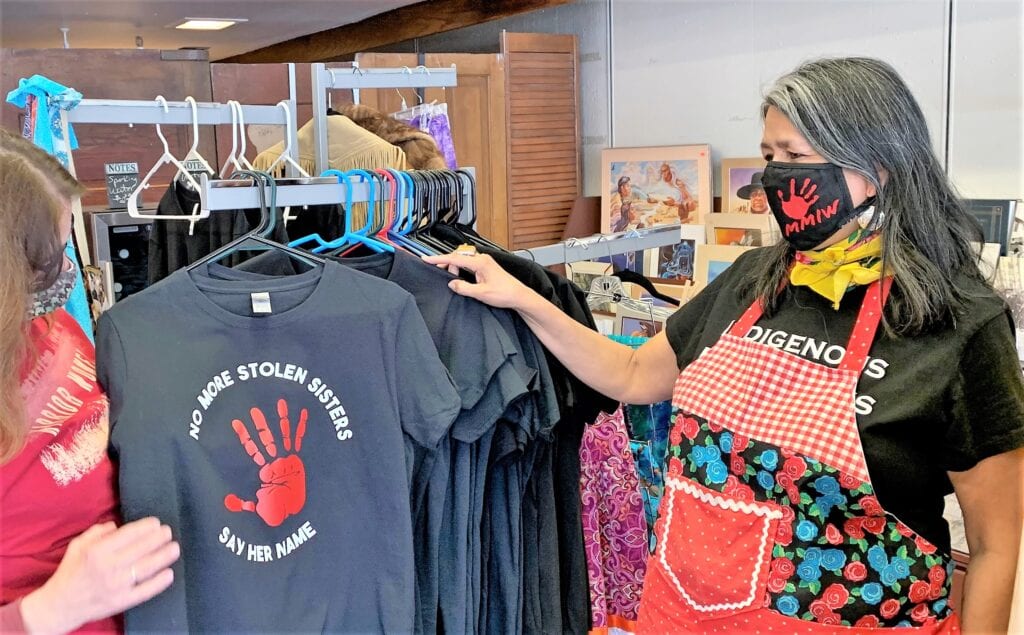Red Ribbon Skirt Society to open liaison office April 1

Lily Mendoza: Donations for “No More Stolen Sisters” t-shirts, silk screened at the Bird Cage Book Store and Mercantile, will go to keep the doors of the office open. Photo by Julie Garreau
RAPID CITY – The Red Ribbon Skirt Society of the Black Hills is set to open a liaison office April 1 for the families seeking justice for missing and murdered Indigenous women. The office, will be at the new downtown location of the Bird Cage Book Store and Mercantile, located on the street level of the historic Buell Building.
The venue, owned and operated by Cheyenne River Sioux Tribal member Lily Mendoza, has hosted the Missing and Murdered Indigenous Women, Children and Two-Spirited Center for Healing, Prayer and Remembrance ever since the inception of this “sacred space” two years ago.
The office, which will be in the adjacent room, “is what we’ve wanted to do for years and now it’s finally happening,” she told the Native Sun News Today.
Mendoza, whose Word Carrier Trading Post is the only Lakota woman’s book seller in South Dakota, opened the store six years ago at its original home in the Aby’s Feed & Seed Building. She was instrumental in forming the grassroots Red Ribbon Skirt Society, in response to what its adherents call an “epidemic of stolen sisters.”
Official statistics on rampant human trafficking, disappearances, and unresolved killings of Native American youth and adults stirred enough community pressure from groups like RRSS nationwide to achieve passage in 2020 of Savanna’s Act.
That federal law ordered the U.S. Attorney General’s office to clarify jurisdictional responsibilities and institute law enforcement protocols to correct the monstrous imbalance in justice for indigenous families.
In its wake, a Presidential Task Force and the Department of Justice, under Operation Lady Justice, opened Cold Case Teams with BIA staff in seven cities, including Rapid City.
However, the cold-case offices fail to take into account the importance of collaboration with community-based actions, such as those of the RRSS, — a must for success in crime solving, Mendoza said.
The society maintains a Red Book containing the names of the thousands of the missing and murdered, which members update and share in answering requests for help from community members.
At a recent weekly meeting of the all-volunteer group, participants reviewed the lack of concrete steps taken to prevent and solve crimes against their constituents, despite the federal initiatives.
“A lot of those federal projects don’t reach out into the community enough,” Mendoza observed. “Grassroots organizations are the ones doing the work. It’s a common problem across the country.”
A 2021 law in the South Dakota Legislature to provide a liaison office for MMIW passed both chambers of the Statehouse with no funding attached and no grassroots consultation from bill sponsors.
“We can’t be waiting around for this,” Mendoza said. “At the same time that they were considering the bill, we were getting it set up.” In fact, Rapid City Chief of Police Don Hedrick just recently met with the society and promised to provide a delegate to liaise with it, she said.
So, Mendoza decided RRSS needed the office. “We really do need a dedicated space to work on missing and murdered indigenous women,” she said, adding that everyone is invited to opening ceremonies.
“Our focus is going to be that we really need to unite in this cause. Nobody owns the souls of these missing women,” she said. “Our responsibility is to take care of and pay attention to these souls.”
The office space will provide the wherewithal for volunteers to research requests, make referrals, hold skills workshops, and schedule meetings, among other things, she said. She expects the police department delegate to be among the first to arrive at a meeting in the office.
Donations for “No More Stolen Sisters” t-shirts, silk screened at the store, will go to keep the doors open, and the site at 524 Seventh St., between Main and St. Joseph streets, could be ideal for storefront messaging that can reach tourists from around the world who visit this area on summer vacations.
“People across the United States either don’t know about this or don’t want to know about it,” she said. Having an office means that RRSS will be taken more seriously, she hopes. But, she said, “We’re not gonna wear shirts and ties. We’re gonna wear ribbon skirts.”
Having the office adjacent to the healing room “just make sense,” she added.
She was using the office to make tobacco prayer ties for the group’s welcoming of the Wakíŋyaŋ spring equinox ceremony when Native Sun News Today accepted a sneak preview. A used refrigerator and microwave were being moved in that day to join the desk she made out of a door and her personal home computer-printer.
The group consists of about 20 active members and hundreds of social media followers offering moral support. Members hope backers will pitch in to donate telephone service and other business needs to help with a full schedule of events on the calendar for the year.
Mendoza credits the society’s effectiveness to its spiritual underpinnings. “We do it in a good way; it’s held together by prayer,” she said.
She hopes the office work will eventually have an impact across Turtle Island. She imagines “starting out in South Dakota, then slowly reaching out to other states. We have an opportunity to create a model for other communities to use in urban settings,” she said.
Contact Talli Nauman at talli.nauman@gmail.net
The post Red Ribbon Skirt Society to open liaison office April 1 first appeared on Native Sun News Today.
